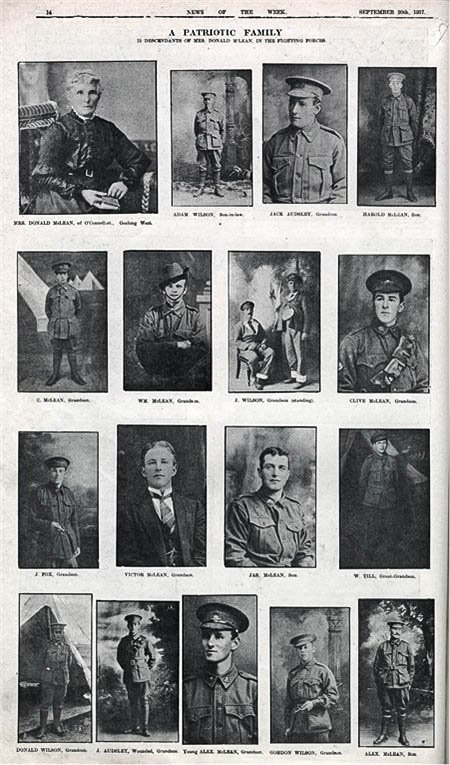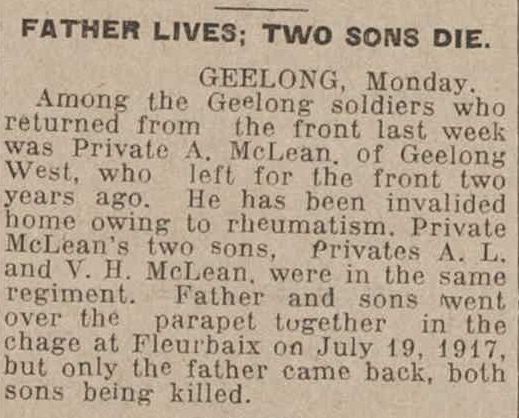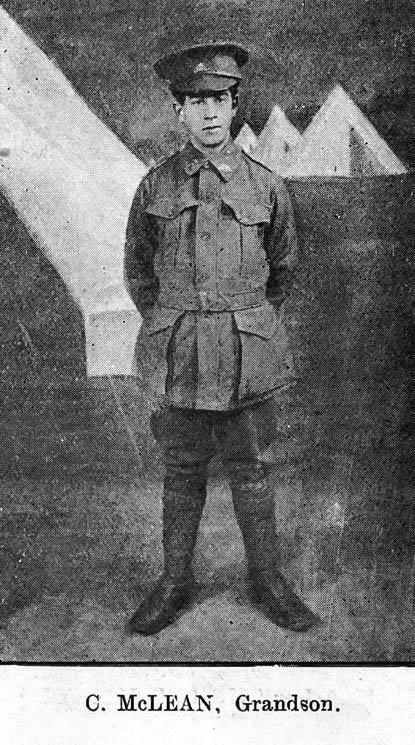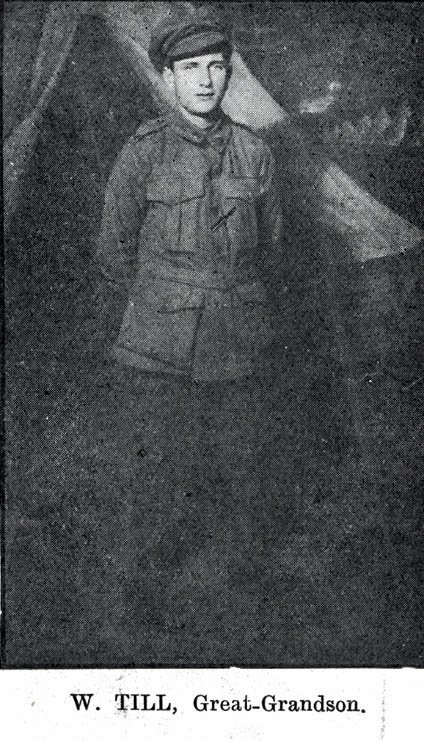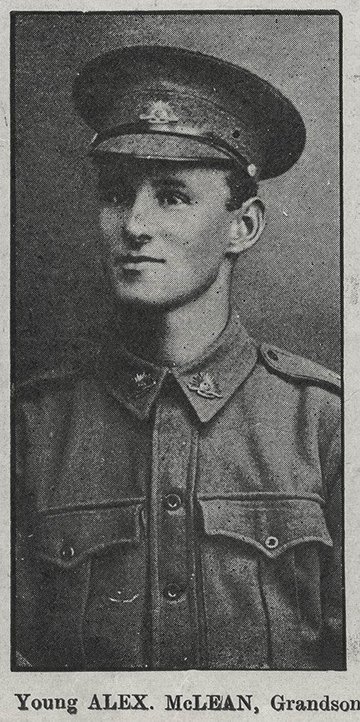
Alexander Leslie MCLEAN
Eyes brown, Hair brown, Complexion fair
The McLeans – A Total Family Commitment
We would like to acknowledge the invaluable assistance of the Geelong Family History Group in compiling this story, particularly in accessing photographs of the McLean family
The McLean family of Geelong, Victoria are a stunning example of the commitment of entire Australian families’ support for the War in Europe.
Mrs Donald McLean, nee Sarah Baker (1840-1926), was the matriarch to a large family. Fifteen of her descendants went on to serve in the War. It is incredible, given the casualty rates in the War, that only two members of the clan were killed in action.
However, the most compelling part of this family’s story is that of Sarah’s oldest son Alex’s family and of his wife Maggie, in particular.
A Father and Two Sons – Off to War
The McLean family were living in Geelong, Victoria in the late 1800’s when Alexander McLean, a house painter, married Margaret (Maggie) McMullen in 1889. They raised one daughter and five sons to adulthood and lost one daughter in infancy.
The girls were the first born - Ruby (1889-1935) and Elsie (1890-91) – followed by five sons born between 1895 and 1911. The children attended state schools in Geelong and by the outbreak of the war, the oldest boys, Alexander and Victor, were working as a bookshop assistant and an apprentice plasterer, respectively. The youngest three boys - Clive (1900-1972), Mervyn (1903-1974) and Raymond (1911-1982) – were still of school age.
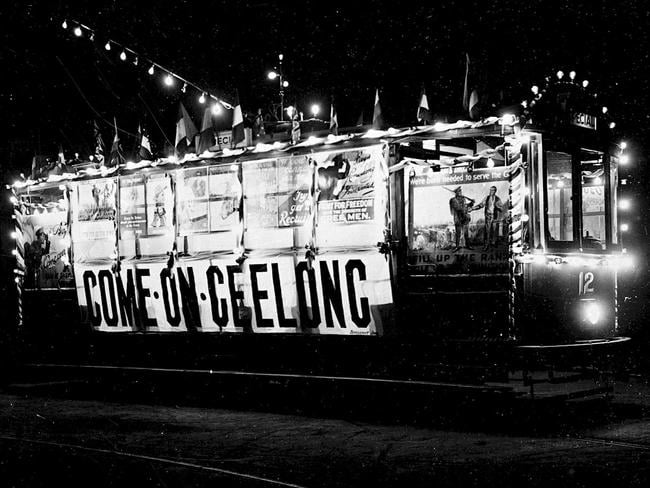
The early passion at the outbreak of war and the dreadful losses at Gallipoli stirred up great patriotism and fervent recruitment drives. It was a message clearly heard in the McLean household.
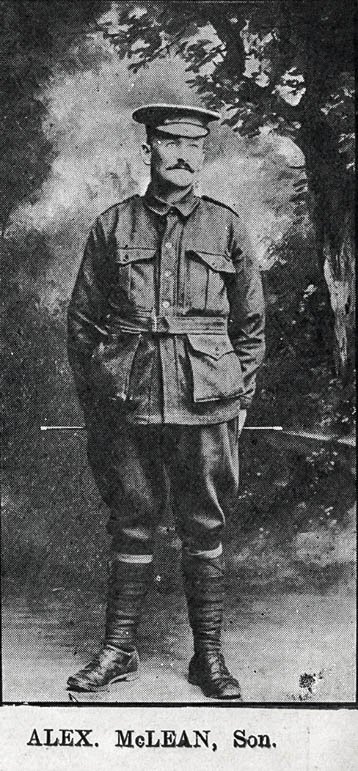
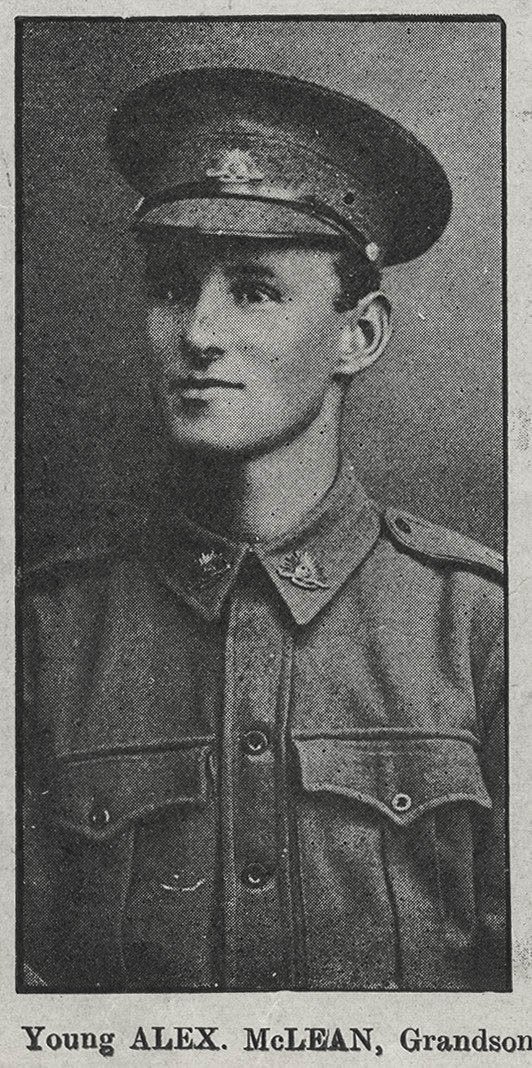
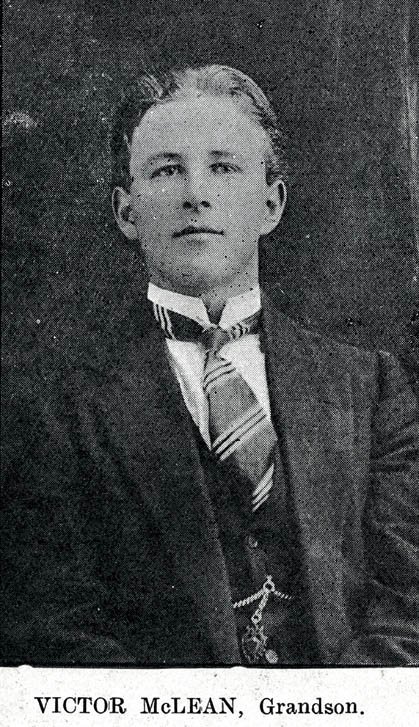
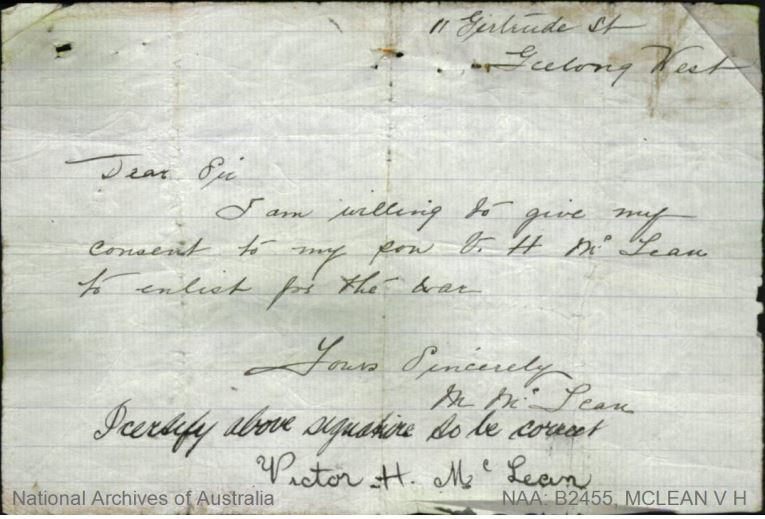
The call to war was answered as a family affair, with all three of the eligible male McLeans enlisting in July 1915. Victor was only 18 and needed parental consent and his parents approved. In contrast, Alex senior, may have lopped a year or two from his age to ensure he was accepted.
Maggie was left to keep the home fires burning and, with Ruby married and a baby of her own, to raise the three younger boys while her husband and two oldest sons prepared for war. The McLean recruits were all assigned to the 7th Reinforcements of the 21st Battalion and completed their initial military training in Broadmeadows, Victoria.
On 18 November 1915, the three Privates McLean embarked on the HMAT A18 Wiltshire, arriving in Egypt on 15 December for further training and defence of the Suez Canal. Coincidentally, they were joined by their 23-year-old nephew and cousin, Private 3009A Jack Audsley, who was with the 21st Battalion. Jack was the son of Alex’s sister Harriet.
With the Western Front expanding and the results of the heavy recruiting programs back home, there was a great deal of reorganization of the battalions. The McLeans were kept together and were all assigned to the newly formed 60th Battalion in late February 1916. Young Jack Audsley moved to the 7th Battalion.
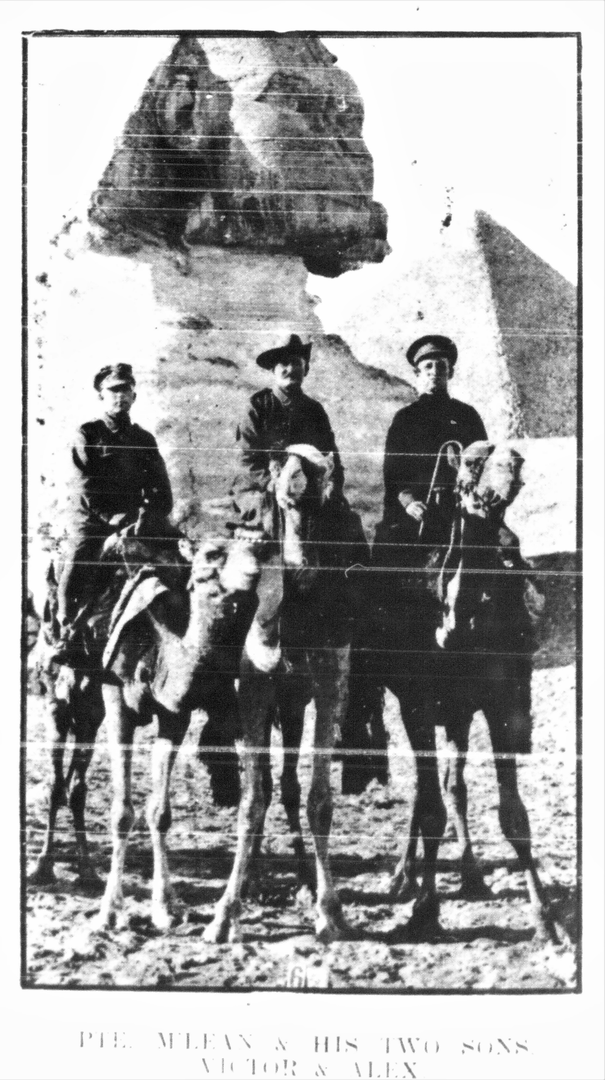
Western Front
After postings in several camps in Egypt, the call to join the British Expeditionary Force in France came in mid-June. The 60 officers and 975 enlisted men of the 60th embarked from Alexandria on the transport ship HMT Kinfauns Castle on 18 June 1916. After a stop in Malta, they arrived in Marseilles on 29 June to board trains to the front, arriving in Steenbecque on 2 July.
Being just a few kilometres from the front, their training continued, although with a higher intensity, we suspect.
The 60th were into the trenches for the first time on 13 July. Just three days later, they were in position for an attack but this was postponed due to unfavourable weather. There was also a gas alarm, but luckily it was just that.
On July 19th, they were again getting ready for an attack and were in position by 4.20 pm.
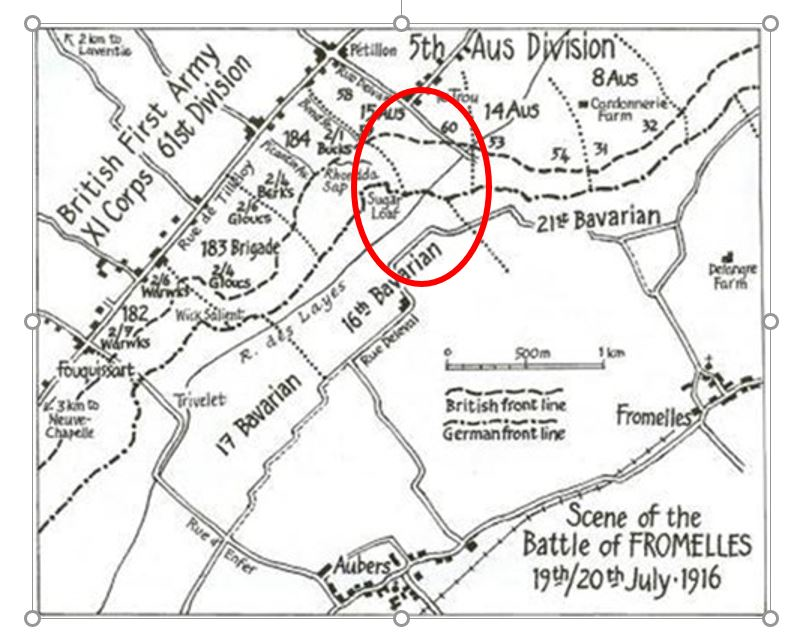
There was heavy artillery from both sides. They were also in a very difficult position, with the ongoing bombardment, facing rifle fire from the German trenches and crossfire from the heavily fortified machine gun emplacement on the Sugar Loaf salient, just a short distance away. The first wave of Aussies went over the parapet at 5.45 pm with the last wave going over at 6.00.
One soldier said that their unit only got to within 90 yards of enemy trenches, but another said he “believed some few of the battalion entered enemy trenches and that during the night a few stragglers, wounded and unwounded, returned to our trenches.”
Fighting continued through the night. With the known heavy casualties in the 60th, they were relieved by the 57th Battalion at 7.00am.
The roll call after the battle was held at 9.30 am. In the Official History of the War, Bean said “of the 60th Battalion, which had gone into the fight with 887 officers and men, only one officer and 106 answered the call”. Victor and the younger Alex were not present – and according to unit records their father Alex was also listed as missing.
With the heavy death toll and confusion surrounding such a battle, finding out just who, if any, of the family survived would have been a challenge. On the 21st through the 23rd, search parties were sent to No Man’s land, but the two McLean sons were not found.
Sergeant John Howard Lau, 3158, spoke of Victor’s death:
“I knew MacLean (sic) personally and saw him dead on the evening of 20th July in No-Man's-Land, Fleurbaix. He was lying in a Sap. It looked as though he had been crawling back, and had got mortally wounded before getting back. He was in the Charge.”
Private A Wyatt, 1593, stated that:
“A. McLean and V. McLean are brothers. They were both killed the same day. They have a father who is in the Bn also - he knows that they are both dead.”
The Aftermath for Maggie
While it is difficult to imagine what Alexander was going through with the battle experience and dealing with the loss of both of his sons, it had been reported to his wife back in Australia that her husband had been killed as well. This was later proven to be attributed to confusion between Alexander McLean and his son, Alexander Leslie McLean and it also seems that Alex was cabling his wife directly with what news he could find. The letter below shows Maggie seeking to clarify confusing reports as to which of her sons was missing and / or killed. A dreadful time for all concerned.
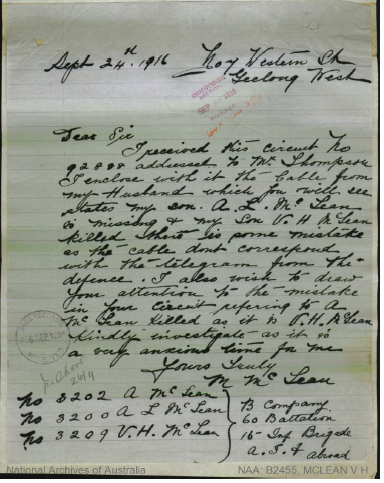
The Aftermath for Alexander
Alexander, despite the loss of his two sons, had to “soldier on”. The 60th remained in the area near Fromelles until 18 October before being moved to outside Paris. They were then moved to Amiens, Dernancourt and Flesscells to join in the activity in the northern area of the Somme.
His further experiences continued to be unenviable. The November War Diaries summary (AWM) cites there being heavy rain and marching through slush. The Major in charge of the 60th War Diary was not one to mince words about the conditions:
“Arrived at ‘D Camp’, what a travesty. A few dozen sodden stinking dugouts, many without cover of any sorts. No chance of getting the men dry and altho’ a good hot meal was served, the men were looking very wretched in the cold light of early morning.”
That afternoon they marched five miles to relieve the Welsh Guards at Needle Trench. After 1½ miles:
“…we had fallen into and climbed out of all the shell holes we could conveniently find, dragged through a thousand yards of the best churned land, you have to actually do this to appreciate its meaning, wriggled through an enemy barrage and lost ourselves several times we fell into an alleged trench. There are no communications and it is remarkable that we escaped with 1 killed and 5 wounded.”
“The Bn. was now in a very bad condition, the irregular meals and sleep due to continued movement added to the heavy marching played havoc with the tempers and physical condition of the men and the three subsequent days in the front line have produced an alarming amount of sickness and Trench Feet.”
“I am writing this on my last sheet of paper and beg to apologise for its dirty condition.”
On 1 December, the 60th was relieved. They still had a long march out, but at least were given a hot meal, able to get their boots off and had dry blankets.
On 3 December, Alexander was sent to hospital with pleurisy and on the 20th with bronchitis.
On 25 January 1917, he was finally moved out of the battlefield and on to the 3rd Division HQ Salvage Company in the UK where he remained for most of 1917.
Maggie’s Plea
At home, Maggie would have been dealing with her own grief and the needs of her other three sons all the while growing increasingly concerned about her husband’s health. Eventually, she wrote to authorities pleading that Alex, snr had done his bit and should be returned home.
In August 30, 1917, Thomas Trumble, the Acting Secretary of the Department of Defence, forwarded this letter to AIF HQ in London:
“The following copy of a communication which has been received in this Department is referred to you for consideration and favor of report please.”
“Excuse the liberty I am taking in writing to you. I will state my case and leave it for you to judge.
It is now close on two years since my husband and two sons enlisted. They sailed together and were in the same Battalion up till the 19 July of last year in which I lost my sons, one missing and the other killed.
My husband has never been the same in health since that awful day and after being in the trenches last year. He has been before 4 or 5 boards and been marked unfit, still they keep him there, although he has been put at H.D.Q. carrying letters etc.
I think he has done his bit, and after losing two good sons as Capt. Kerr says whom any mother can be proud of, I wish to ask you if you could do anything for me in returning him before another winter sets in now being unfit.
His age was 47 last month. Late of the 60th Battalion, now No.3202 Private A. McLean with HDQ, 3rd Division AIF, abroad.”
Maggie McLean’s desperate plea was successful as Private Alexander McLean was returned to Australia in December 1917, his file stamped “family reasons”.
Alex finally left for home and was discharged in February 1918. He returned to his job as a painter until he retired in 1937. He died in 1939, age 69.
Clive’s Drive to Serve
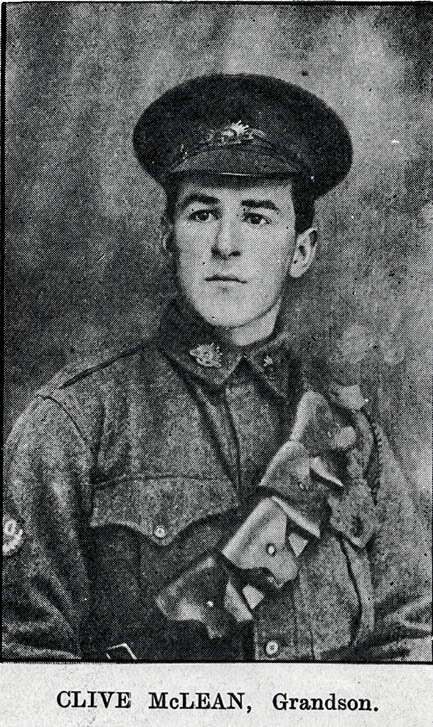
In addition to coping with the loss of her two oldest boys and an ailing husband who was far from home, Maggie was also dealing with a very determined teenaged son who was desperate to enlist, even though he had lost two brothers.
Young Clive, just 16, tried to enlist under his own name, but his mother had objected. In May 1917, he enlisted again under the name ‘George Smith’ giving his sister (Mrs Ruby Maxwell) as his next of kin.
When Maggie discovered this, she was desperate to keep her son safe but terrified he could enlist without her knowledge and just disappear.
Accordingly, she wrote the following heart-breaking letter dated 31 May 1917 to authorities:
“Dear Sir,
Having seen fair warning to parents in yesterday’s paper referring to lads enlisting under age. I wish to let you know my son enlisted some time ago under his own name but I cancelled. Later he enlisted in Geelong and passed but under the name of G. Smith making his married sister his guardian.
After considering it carefully, I have decided to give my consent as he will enlist again & I would never know when or the name he might take. I have lost two elder sons in France & my husband has been on service for two years and is in France so you can imagine how his heart & soul is bent on going.
He is a big lad for his age as he is not 17 for a few months. Perhaps you could find him home service till he is able to go as I will never know where he enlists from again and I would rather give my consent now. Trusting you will consider this matter for me as I know he will try elsewhere if discharged.
Yours sincerely,
M. McLean”
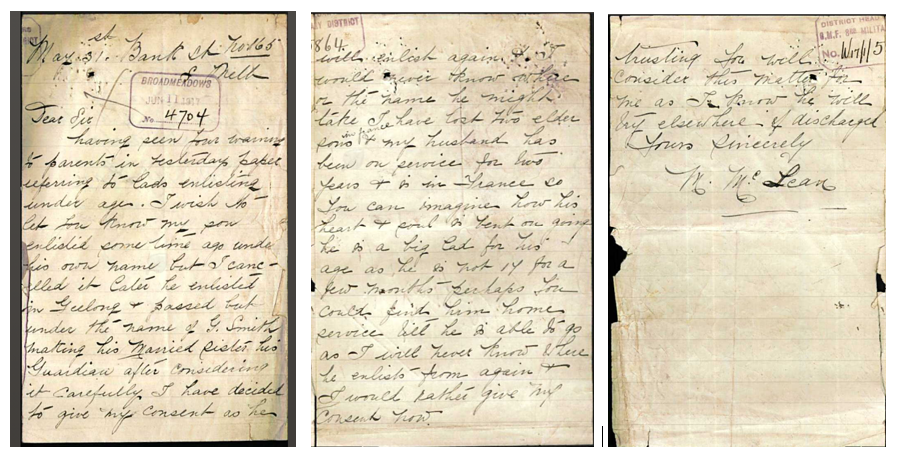
Clive, born 27 October 1900, was eventually discharged in July 1917 being under 18 years and it seems he did not attempt to enlist again for the duration of the war. He did, however, serve with the Navy between 1923 and 1925. He later worked as a railway labourer before his death in 1972. His youngest brother Raymond Clinton McLean (1911-1982) served in the RAAF during the Second World War.
A Family’s Grieving
The family grieved the loss of their two sons. The following are examples of the memorial notices published in the local newspaper (Geelong Advertiser, 19 July 1919):
McLEAN.-In loving memory of our dear sons, Alex. and Vic., killed in action in France July 19tb, 1916.
Jesus, Thou Prince of Life,
Thy chosen cannot die;
Like Thee, they conquer in the strife,
To reign with Thee on high.
We pictured their safe returning-,
And longed for a clasp of their hand;
But God has postponed our meeting
'Twill be in a better land
-Inserted by their loving parents, A. and M. McLean.
McLEAN.-In loving memory of Pte. A. L. McLean, killed in action somewhere in France July 19th, 1916. -Mr. and Mrs. B. T. Bonney and family.
McLEAN.-In sad and loving memory of our dear brothers, who were killed in action in France July 19th, 1916.
Some day, sometime, our eyes shall see
The dear faces we hold in memory;
And Christ shall link the broken chain
Still closer when we meet again.
They needed no recruiting speeches,
They answered their country's call;
They were two of the boys who were willing,
Must they all keep on till they fall?
- Inserted by their loving sister Ruby, brother-in-law and brothers, Clive, Mervyn and Ray.
The burial sites for Victor and Alexander are still unknown but they are commemorated at VC Corner Memorial (panel 21) near Fromelles, France and the Australian War Memorial Roll of Honour (panel 170) in Canberra. Their names are also recorded on the Geelong Peace Memorial.
Maggie and Alex received the medals and honours to which their sons were entitled - 1915 Star Medal, British War Medal, Victory Medal, Memorial Scroll and Memorial Plaque.
The Broader McLean Clan
As noted earlier, fifteen of Sarah Baker McLean’s family volunteered to serve.
Sarah’s two youngest sons
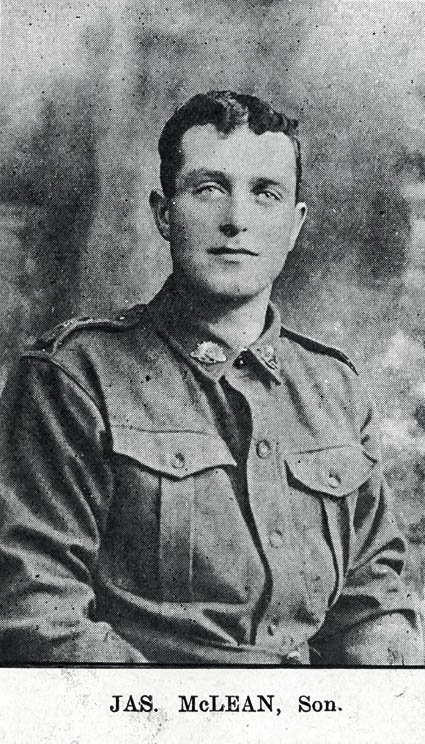
James McLean (1882-1963), son of Sarah and Donald McLean
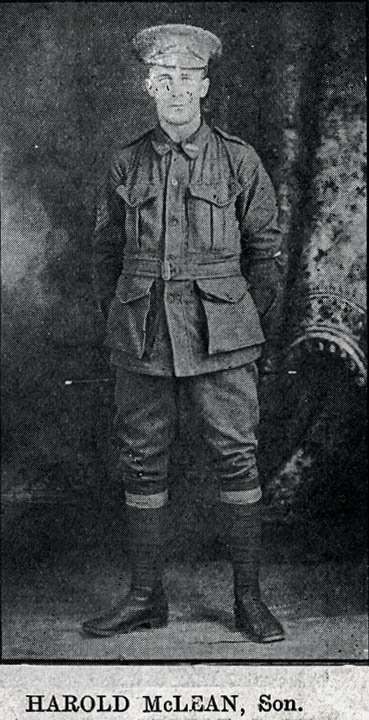
- 604 - Private James Leslie McLean (1882-1963), 29th Battalion – enlisted Jul 1915, returned April 1919
- 1473 - Private Harold McLean (1886-1962), 34th Battalion – enlisted December 1915, returned February 1917
Three related to Sarah’s son, Angus McLean (1859-1936)
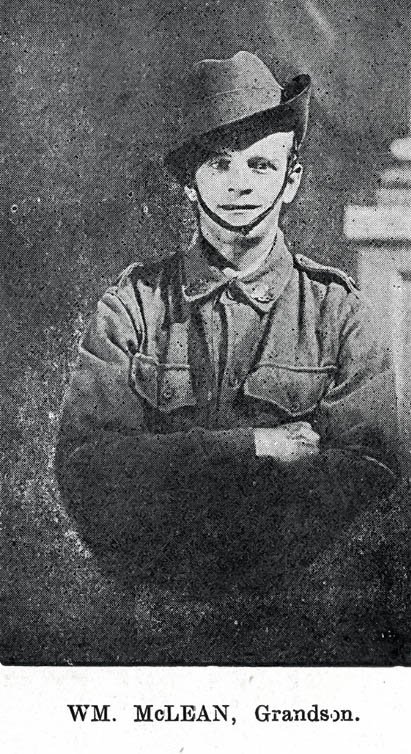
Two sons and a grandson of Angus McLean and his wife, Mary Dalton – William McLean
- 6857 - Private William McLean (1897-1962), 23rd Battalion – enlisted February 1917, returned July 1919
- 3454 – Private Clarence McLean (1900-56), 60th Battalion – enlisted May 1917, returned April 1919
- 6897 – Private William Till (1899-1965), 23rd Battalion – enlisted February 1917, returned September 1919
William McLean and his nephew, William Till, embarked together on HMAT A11 Ascanius on 11 May 1917. William Till was a similar age to his two uncles and was the son of Angus’s eldest daughter, Esther Sarah McLean (1880-1916), and James Till. As his mother had died, William Till listed his grandmother, Mary McLean, as his next of kin.
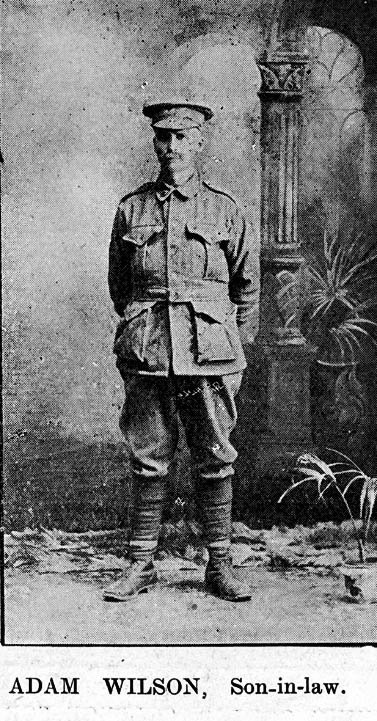
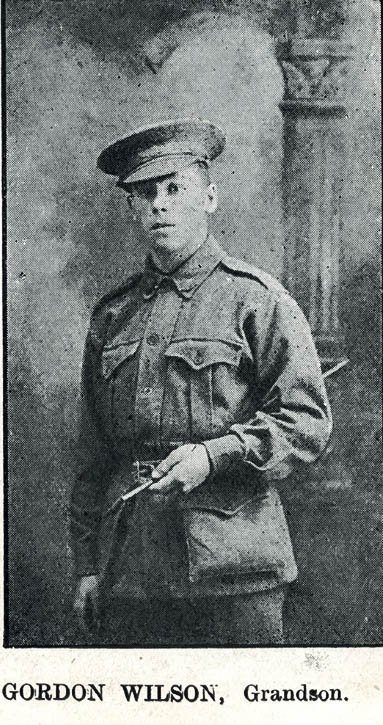
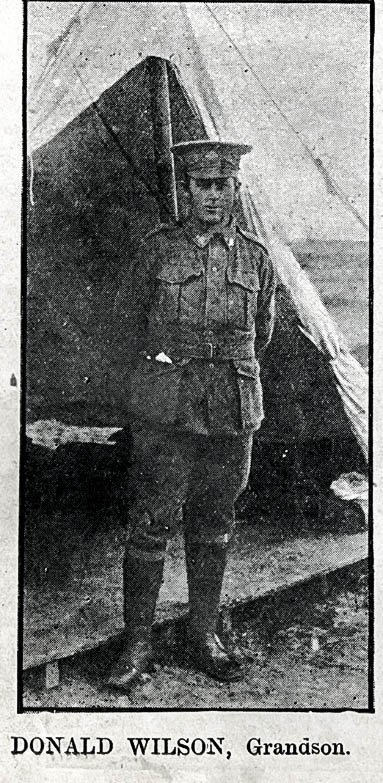
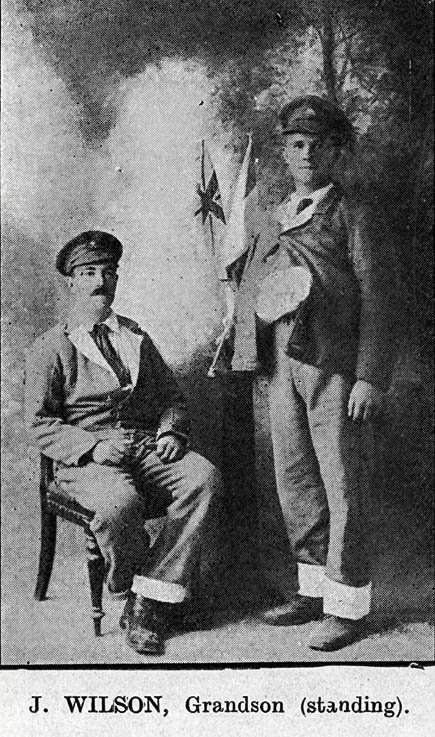
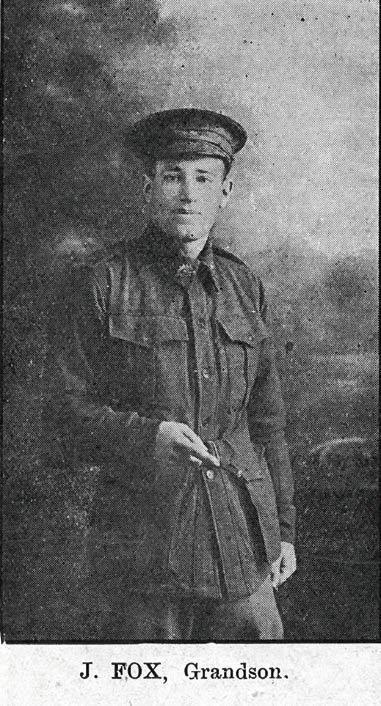
Five connected to Sarah’s daughter, Emma Wilson, nee McLean (1866-1942)
- 4919 Private Adam Wilson, snr (1870-1940), 8th Battalion – enlisted November 1915, returned May 1917
- 4920 Private Adam Lindsay Gordon Wilson (1898-), known as Gordon, 8th Battalion – enlisted November 1915, returned June 1919
- 4956 Private Donald Wilson (1887-1955), 5th Battalion – enlisted November 1915, returned January 1918
- 775 / 2093 / 775 Private John Wilson (1891-1941), 8th Light Horse / 23rd Battalion / 10th Machine Gun Co – first enlisted November 1914, finally returned January 1918
- 5821 Private John Frederick Milgate Fox (1893-1967), 24th Battalion – enlisted August 1916, returned July 1919 John Fox was married to Adam and Emma’s daughter, Emma Caroline Wilson.
Adam Wilson, senior, was another father who enlisted with his son – Adam Gordon Lindsay Wilson, junior – known as Gordon. Donald enlisted some weeks after his brother and father and was assigned to a different Battalion. Adam senior was discharged and returned to Australia early as he was over-age.
John Wilson was a Gallipoli veteran who enlisted three times having been returned home twice to recover from illness and wounds. The photo of John shows him with a heavily bandaged hand; it is likely to have been taken in mid-1916 as his 2nd medical discharge was due to a septic right hand.
Two sons of Sarah’s daughter Harriet Audsley, nee McLean (1868-1941)
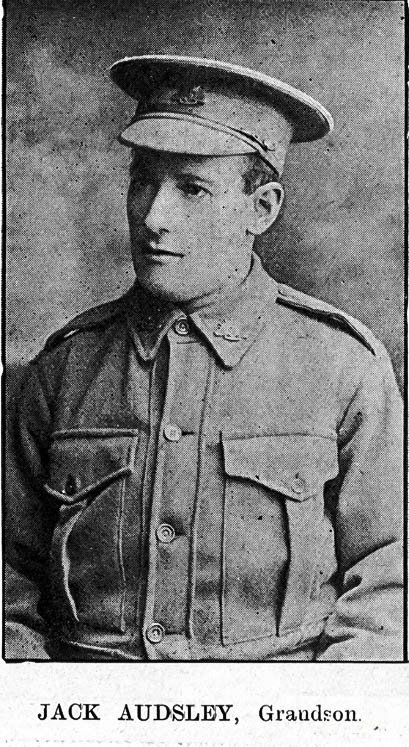
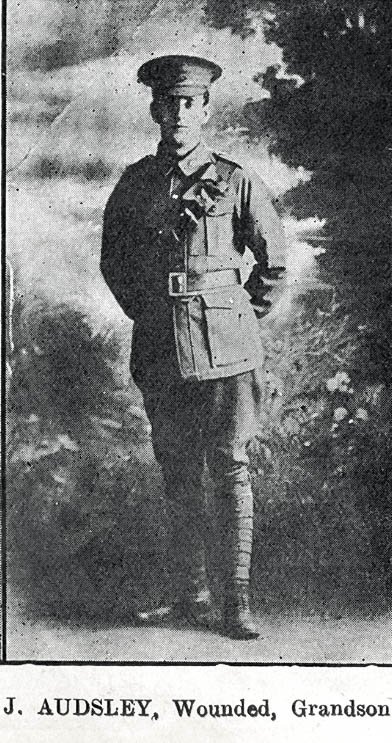
- 3009A Private John (Jack) Audsley (1892-1942), 21st Battalion – enlisted July 1915, returned March 1919
- 15046 Private Percy Audsley (1894-1955), 1st Field Engineers – enlisted September 1915, returned July 1919
Jack Audsley left Australia with Alex McLean and his two sons, Alex and Victor, on board the HMAT A18 Wiltshire, but he did not follow his uncle and cousins to the 60th Battalion and was not at the Battle of Fromelles. In fact, at the time of the battle, Jack was recuperating in England from a gunshot wound received in action.
A patriotic family indeed!
Closure Still Escapes the Family
In 2008, a mass grave that had been dug by the Germans outside of Fromelles was discovered. It contained the remains of some 250 soldiers.
With this discovery, there was an Australian Defence Force project to try to match DNA of the soldiers in the grave with living relatives to be able to honour the soldiers properly.
The identities of a great many of the soldiers have been confirmed, but as yet, neither Victor nor Alexander have been identified.
DNA is still being sought for family connections to
| Soldiers | Alexander Leslie McLEAN 1895-1916 and Victor Henry McLEAN 1897-1916 |
| Parents | Alexander McLEAN 1870-1939, Victoria | ||
| and Margaret McMULLEN b. abt 1869 d. 1946 in Victoria |
| Grandparents | |||
| Paternal | Donald McLEAN b. 1835 Scotland d. 1921 Geelong, Vic and Sarah BAKER b 1840 Essex, England d. 1926 Geelong, Vic | ||
| Maternal | John McMULLEN b. abt 1827 d.1901 in Colac, Victoria and Margaret CLOSE 1828-1903, died in Geelong, Victoria |
Seeking DNA Donors

Contacts
(Contact: royce@fromelles.info or geoffrey@fromelles.info).
(Contact: army.uwc@defence.gov.au or phone 1800 019 090).
Donations
If you are able, please contribute to the upkeep of this resource.
(Contact: bill@fromelles.info ).
